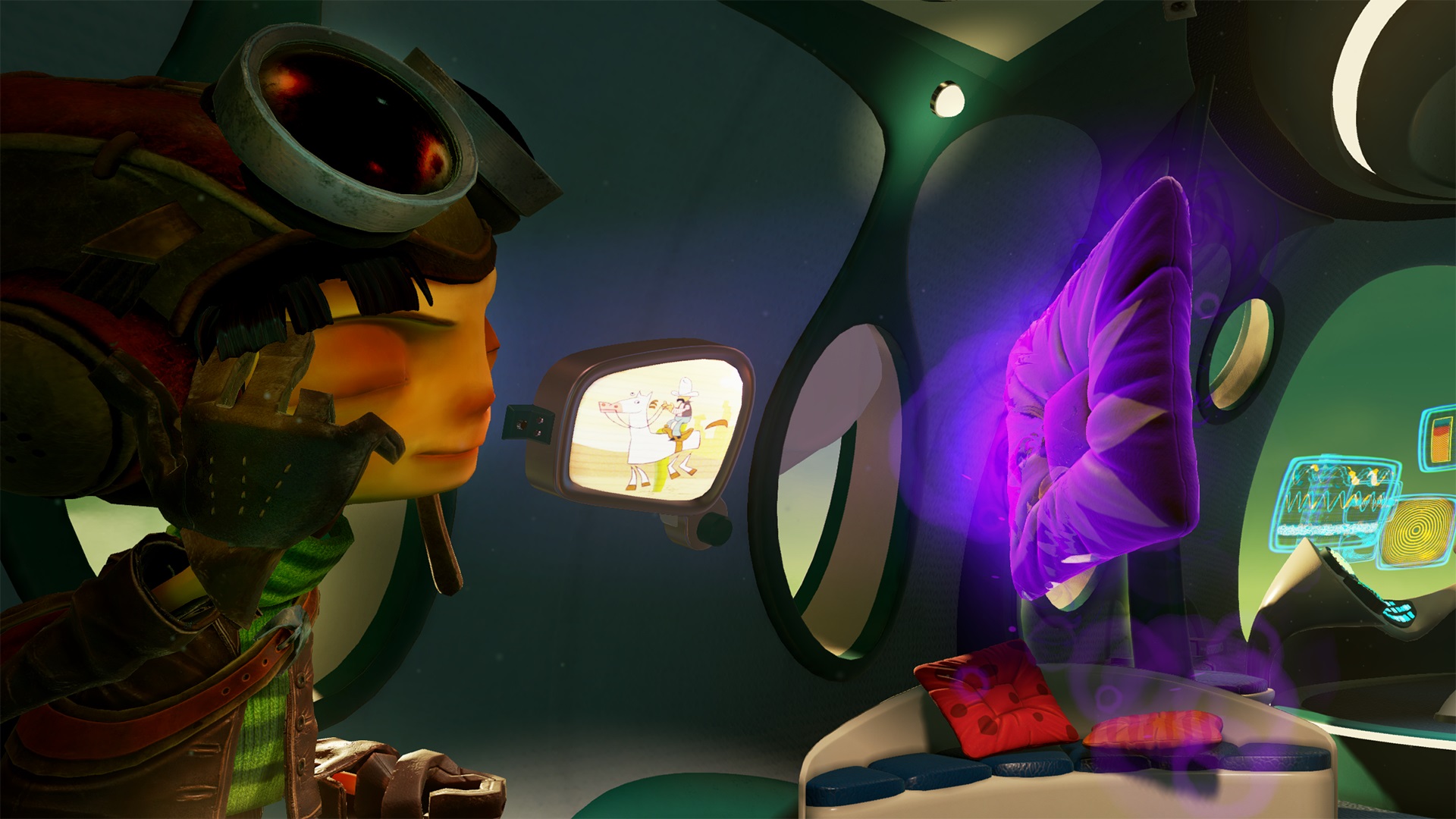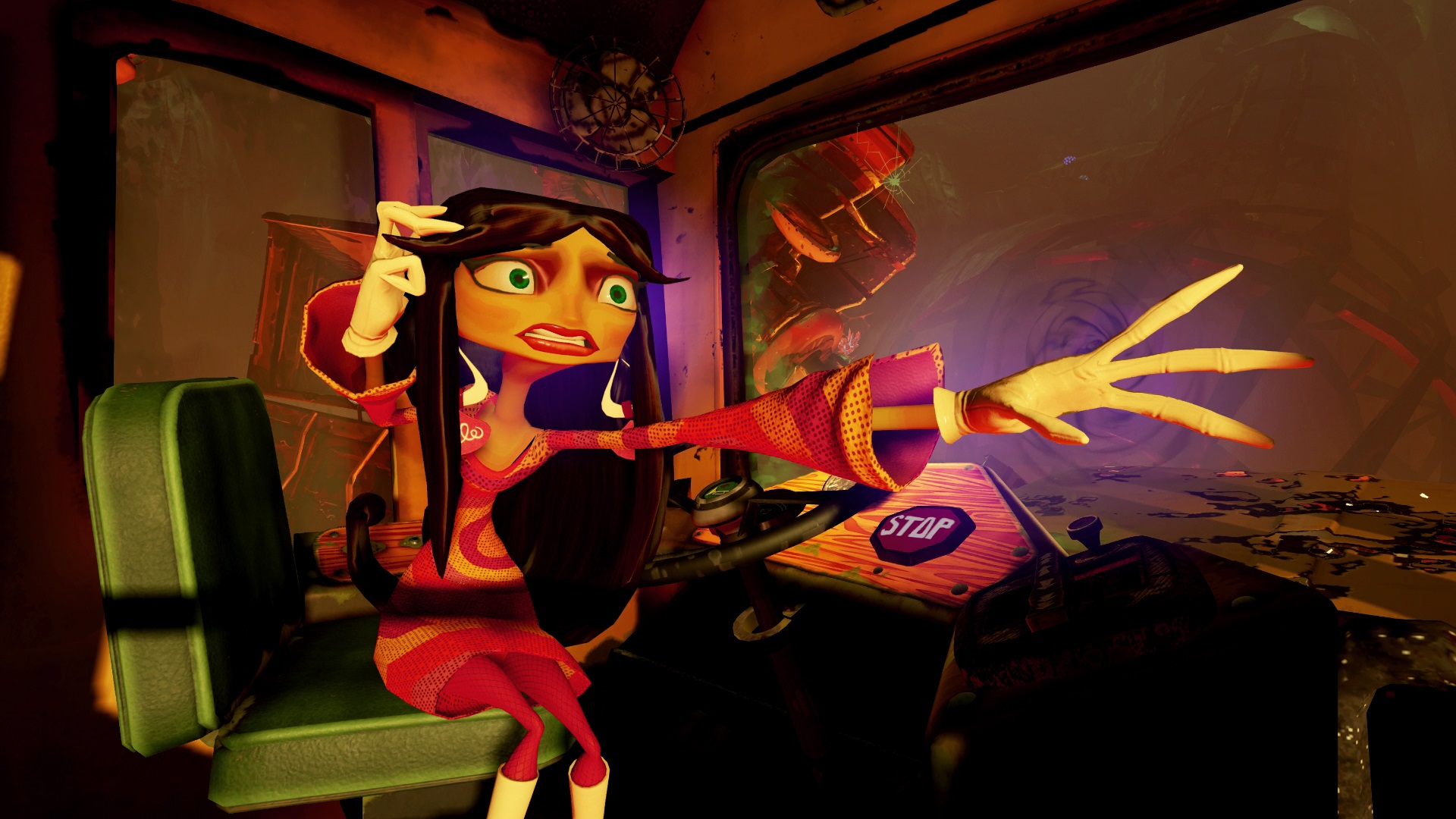I really want to deliver you some good news, here. I want to tell you that the Psychonauts, long thought lost to the fabled realm of cult classics, have made their triumphant return in a game that’s truly worthy of their twisted world of psychic agents. I want to tell you about a mind-bending VR experience that plays with your psyche in clever, astonishing ways, just as Raz did when he climbed into the heads of characters in the first game.
Sadly, Psychonauts in the Rhombus of Ruin is not that experience.
There are things to love in this brief spin-off to the 2005 platformer that developer Double Fine made its name with. The cast, for example, is back together and writer and development legend Tim Schafer hasn’t lost his grasp on them. Rhombus of Ruin is VR’s first introduction to the wit, soul, and sheer creativity of Double Fine’s world building, and in that respect it doesn’t disappointment. I’d chuckled to myself multiple times within the first scene, and some of the game’s sights are truly spectacular. No one does weird quite like these guys, and it shows here.
Back in control of Raz mere minutes after the cliffhanger ending of the first game, the developer has crafted a 2-3 hour adventure in which you’ll attempt to save the father of your maybe-girlfriend, Lili. It’s seen clear opportunity in translating the first game’s psychic power-infused platforming into a VR puzzler that more closely resembles one of Schafer’s classic point-and-click adventure games like Grim Fandango or Day of the Tentacle.
As well intentioned and respectable a throwback this might be — clearly influenced by the design challenges of VR that can cause simulation sickness — it ultimately leaves this chapter in the Psychonauts saga feeling decidedly inessential, restrictive, and dated.
Many of the game’s core mechanics are incidental, and not anywhere near as satisfactory to use as they should be. If you’re familiar with VR, then you’ve probably picked things up and moved them with your ‘mind’ before. It’s a mechanic as old as the first full retail VR games like Land’s End on Gear VR; you look at an item, you press a button to bring it towards you, and then you move it by steering your head.
It’s a necessary component of the game, but it would have you think it’s novel and empowering, when really it’s a somewhat laborious way of shifting items around. As harsh as that sounds, it’s consistent with most of the powers you can use; serving a design purpose more than a genuinely fun mechanic to utilize. Body-hopping clairvoyance, for example, is much the same, a mesh of mechanic and locomotion that doesn’t excuse the fact everyone’s rooted to the same spots.
Pyrokinesis, meanwhile, suggests sections in which you can giddily burn your surroundings to the ground, but these never materialize. It’s reduced to often redundant actions like burning specific items that block your path, and feels almost totally useless once the more satisfactory Psi-Blasts come into play, which at least give a kick to their use.
I just never felt like the more powerful psychic agent Raz had grown to become by the end of the first game. There’s an argument to be made for Double Fine’s intentions to deliver a different kind of experience, but it comes off as overly limited.
There are glimpses of what the game could have been, which occur when the puzzle-solving is at its spontaneous best. Rapidly flinging suitcases down a corridor to block a door, or shattering the glass of a fish tank to snap someone out of a trance were impulse-based actions where I reacted naturally to the world around me. When I stumbled with working out which power I needed to use where, however, characters would repeat unhelpful lines of dialogue ad-nauseum.
Psychonauts In the Rhombus of Ruin never really gets inventive with VR, at least not until two sequences towards the end in which you visit the mind of a fan favorite character. Though this involves a trite boss fight, there’s an element of storytelling here that truly capitalizes on the connections VR can enhance with characters, and the clever spins it can take with scale and environments. I had hoped for the trippy, surprising ride these precious few moments delivered right the way through, but ultimately this was all it could muster even in the short run time.
A missed opportunity for sure, then, made all the more bitter by the fact the series didn’t need to radically reinvent itself to fit VR. Lucky’s Tale and Wayward Sky show third-person platforming works in VR, and the latter’s mix of first-person gameplay proves Double Fine could have had the best of both worlds here. Ultimately, it’s just like PSVR’s Batman game, missing crucial elements of what makes the IP so compelling.
Psychonauts in the Rhombus of Ruin gives fans a reason to be excited for Psychonauts 2, if only because it shows Double Fine hasn’t lost is grasp of the wonderful world it concocted 12 years ago now and not much else. As a VR game this is most often dated and only rarely the eye-opening adventure that a VR game about characters that can climb inside your psyche should be. I’m happy that the Psychonauts are alive and well, however anyone but the series’ most devoted fans should wait until next year for what will hopefully be the coming home party they so truly deserve.
Psychonauts in the Rhombus of Ruin will be available on PlayStation VR for $19.99 on February 21st 2017. Read our Game Review Guidelines for more information on how we arrived at this score.



























